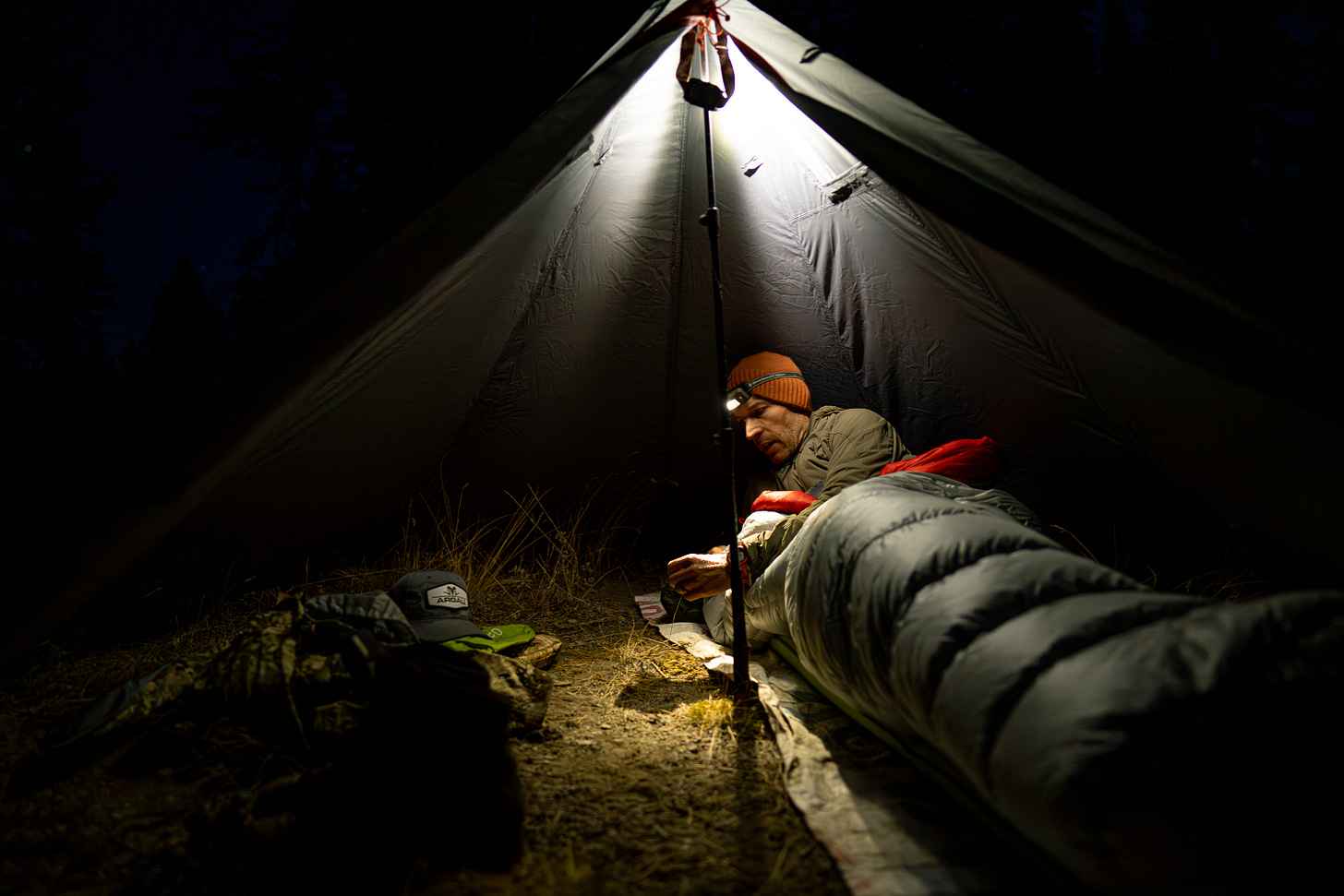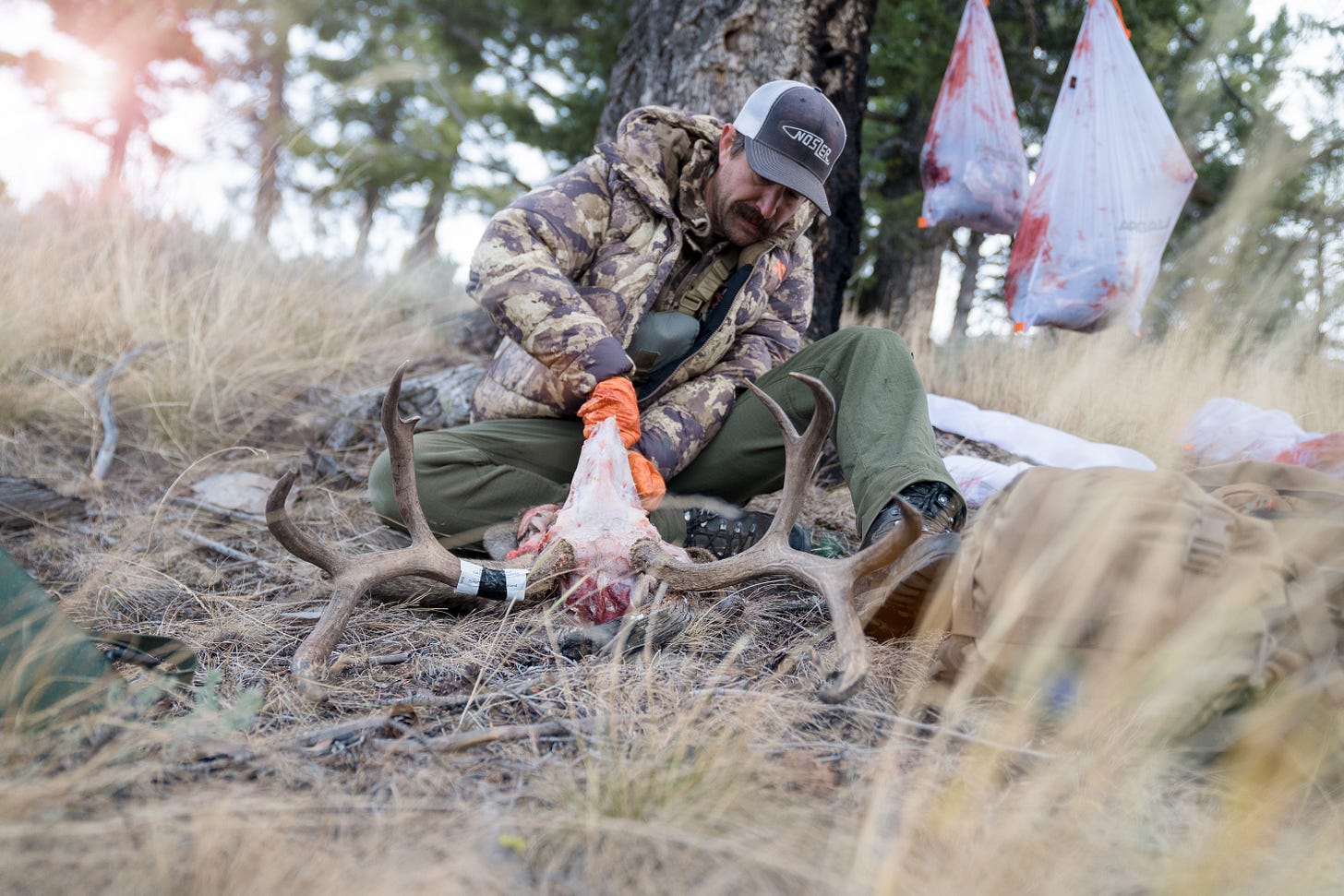Brad Brooks Just Wanted to Tell Stories
Instead, he accidentally built Argali — an ultralight gear brand for backcountry hunters.
This piece originally appeared as our first advertorial brand story in partnership with Argali in our inaugural print issue of The Westrn.
“I’ve drawn out tent designs in the dirt with sticks,” Brad Brooks said, grinning.
Brooks is a bonafide wilderness junkie. He runs to the hills come early fall, and the sort of adventures he tackles are unfamiliar to most casual outdoorsfolk. This is big-country, multi-day wilderness hunting on public land — the kind where you pack in heavy with gear and hopefully pack out even heavier with meat.
Brooks is also the founder and CEO of Argali, a Boise, Idaho-based boutique outdoors brand designing ultralight gear for the backcountry hunter. In 2015, Argali started as a media company during the more organic days of YouTube and social media. Today, the brand’s YouTube channel boasts more than 2.3 million views.
“I didn’t set out to make gear at all,” he said. “Really, we wanted to make films. We started with stories and accidentally built a brand, just by being who we were.”
The stories Brooks’ team tells are indeed compelling. In the Argali film “Hunting the Last Wild Places: The Frank,” a group of mule deer hunters find late-season success by whitewater rafting into the depths of the Frank Church Wilderness. With nearly a half-million views, this film is the brand’s most successful.
It’s also emblematic of what Brooks has been doing since 2005. Back then, he walked into the wilderness with a Gregory backpack, canned food, a 7.5-pound tent, and a few coerced and ill-informed friends. They didn’t know any backcountry hunters, and the educational annals of modern media didn’t exist to show them what to do. They followed only their own volition and desire to become more nimble outdoorsmen.
“The ultimate question becomes ‘How do you cut weight?’” Brooks lamented. “I envy the people today who can just get to the answer. We struggled through it. But when you don’t know the formula, you shortcut the innovative process for building faster, better, stronger, and lighter.”
After years of backcountry hunting, Brooks experienced a lightbulb moment in 2016. He was frustrated with the gauzy, ineffective materials making up the cheap game bags that were supposed to be protecting meat. For over a decade, he endured the idea that he was using them incorrectly. But what if he wasn’t? What if he could redesign game bags to be more durable?
Brooks didn’t go to his nearby fabric store or search online for the right material. Instead, he booked a trip to Outdoor Retailer, a trade show where hundreds of outdoor fabric distributors meet with brands each year. Most fabrics in high-tech gear hail from Asia, and the Japanese businessmen he spoke with were a bit flummoxed by his questions about potential game bag material.
“I wish I could have captured the looks on the faces of the people I spoke with,” Brooks said, laughing. “They had no idea what I was talking about, but they absolutely helped me figure it out.”
Brooks set out to create a reusable, tough-as-nails, ultralight game bag system that protected meat, hung easily in trees for scavenger protection, and could be laundered once its duties were finished. He and his wife bootstrapped the first product release on a whim and a prayer. It immediately sold out. Brooks realized he was onto something. In the fall of 2017, Argali became a gear company.
“I had no notion that anyone would buy anything we made,” Brooks said. “When they did, I asked myself what else we could improve on. We took those questions into the backcountry, and that’s where [we developed] ideas for more efficient knives, trekking poles, tents, and sleeping systems.” Brooks noted his adventures now serve as annual design retreats where off-the-grid problems come back to the office for design solutions.
The brand is quick to point out the multipurpose effectiveness of most products. Brooks’ favorite — the ‘most unique and innovative’ in his words — is Argali’s Kodiak belt ($75). The buckle doubles as a knife sharpener that also sharpens broadheads and fishing hooks. It’s low-profile and designed to sit beneath the hip belt of a heavy backpack. Other innovations include trekking poles that serve triple duty as shooting sticks, binocular monopods, and center poles for Argali’s ultralight tent systems.
For anyone pursuing backcountry adventure, the desire to cut weight lives in this multipurpose formatting. This through-story offers expanded utility to backcountry enthusiasts as well as hunters, and Brooks points out that Argali’s customer service intends to make good on the promises of its products.
“We treat each customer exactly how I’d want to be treated,” Brooks said. He is definitive about this.
Early in Argali’s existence, a group of customers received a defective run of game bags. He immediately replaced them at no additional cost. It was a tough loss financially, but he insisted it was also the right thing to do. When something doesn’t work, he says, you own your mistakes — whatever the cost.
“Making a product is a really vulnerable process,” Brooks said. “You could easily start questioning your validity in the moments where things go wrong, but I also believe there’s an audience for everyone and everything, especially when you’re willing to be radically honest about your experiences.
“People connect to people, and brands become iconic because people crave connection. It’s in our DNA and in our blood. At the end of the day, that sense of community is really the goal of Argali.”
Our long-term goal is to ethically and intentionally integrate partnered brand stories and community-centered advertising into The Westrn. This is based on our pragmatic and experimental approach to making this a sustainable enterprise, while maintaining our personal integrity. We’re deeply grateful to work with independent businesses like Argali that share our values.
These partnerships support The Westrn’s efforts to build community, tell human-centered stories, and educate the public about the outdoors. All advertorial stories will focus on these components, rather than direct reviews or paid product placements. We will always be transparent with readers about brand relationships.
Questions? Comments? Interested in partnering with us? Our rates are affordable and thoughtfully scaled for small, independent businesses rather than large corporations. Email editor@thewestrn.com to learn more.




